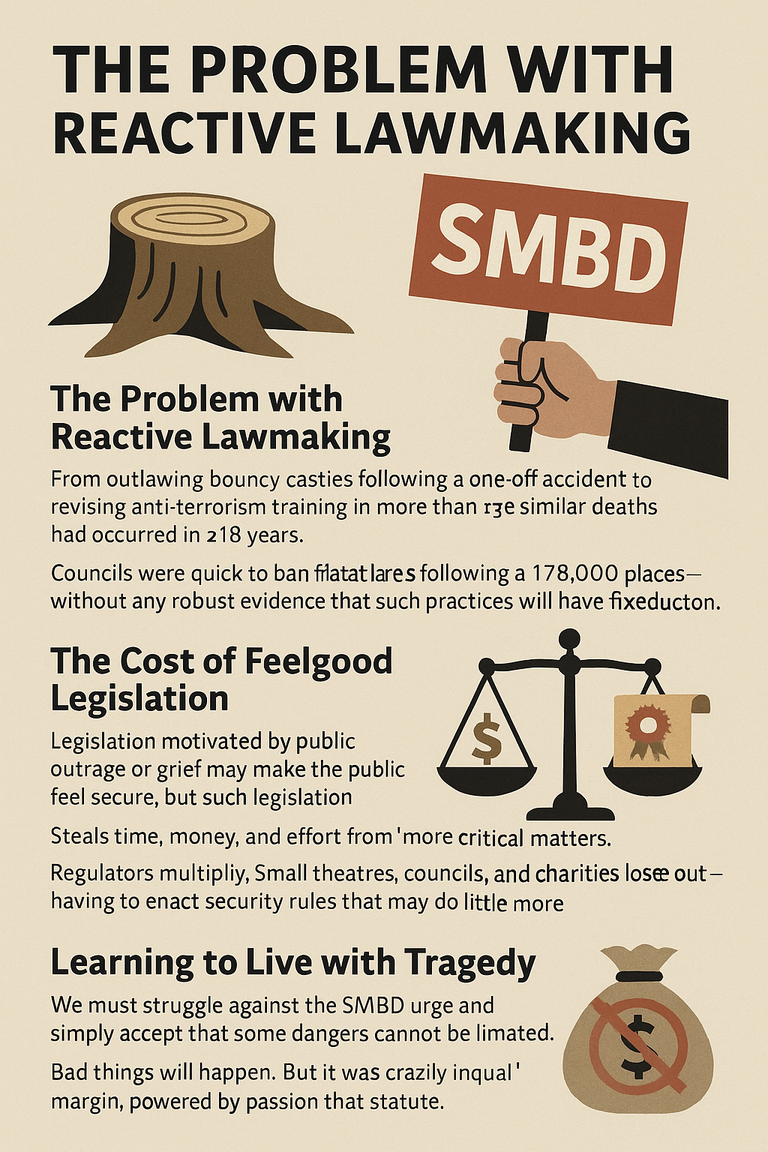The SMBD Reflex: Where Emotion Takes Precedence Over Policy
When a centuries-old oak tree was recently felled in Enfield, the knee-jerk reaction of many was that "Something Must Be Done" (SMBD),and this usually means calling for new legislation, or what we might call 'reactive lawmaking'...

The Problem with Reactive Lawmaking
Britain has a tendency to over-legislate following unusual occurrences.... Some councils have banned bouncy castles after one off freak accidents and with the recent Taylor-Swift inspired mass murder quiet community halls across the land are reviewing their anti-terror policies.
Martyn's Law, named after one of the Manchester Arena bombing victims, now requires anti-terror training in more than 178,000 places—pubs, schools, churches—without any robust evidence that such practices will have a significant impact on risk reduction.
The government's own impact analysis found that Martyn's Law would cost £1.8 billion over a decade, for an estimated benefit of £20 million. That's a crazily unequal margin. But it was still enacted anyway: passion and emotion rule over impartial policy impact analysis.
The Cost of Feelgood Legislation
Legislation motivated by public outrage or grief may make the public feel secure, but such legislation is they rarely proportional or effective.
Worse, they steal time, money, and effort from more positive initiatives which could benefit thousands.
Legislation also ends up hurting small organizations more as they have to spend a disproportionate amount training staff or modifying buildings to fit in with newly updated safety legislation.
Learning to Live with Tragedy
Personally I think we should resist the SMBD urge and simply accept that some dangers cannot be eliminated. Bad things will happen to us. Good government's task is to accept that fact and focus on doing positive things, not being reactive.
It's no use implementing policy that feels good, and at best accomplishes nothing, at worse actually costs us more!
Indeed, reacting quickly out of emotion to incidents doesn’t always lead to effective solutions.
I couldn't agree more.
There was an awful, awful one in Tasmania a few years back. Really tragic. But it was a freak accident. I certainly wouldn't get on a jumping castle, that's for sure. Or a hot air balloon, or a bungy rope, for that matter.
How about just educate people to educate themselves on risk, and take responsiblity for it. Anything else is Darwin's law.
Congratulations @revisesociology! You have completed the following achievement on the Hive blockchain And have been rewarded with New badge(s)
You can view your badges on your board and compare yourself to others in the Ranking
If you no longer want to receive notifications, reply to this comment with the word
STOPI doubt it will get any better, you can't do anything nowadays without there being a regulation or rule to follow about it - and the worst thing is they never tell anyone about it your just expected to know. The bouncy castle is a classic example though - there is nothing wrong with them as long as they well secured with stout pegs all around - and not used when it is windy - all common sense really. Instead of trying to ban something they would have been far betting requiring a pre-use safety check by an official that was charged for.
Your reply is upvoted by @topcomment; a manual curation service that rewards meaningful and engaging comments.
More Info - Support us! - Reports - Discord Channel